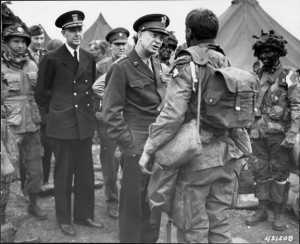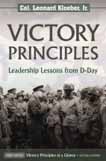Archive for the ‘SHAFE’ tag
The Supreme Commander: General Dwight D. Eisehhower

Gen. Eisenhower visits 101st Airborne just before D-Day on June 5th 1944 at their airfield in England
In December 1943, President Roosevelt announced that General Dwight D. Eisenhower would be designated as the Supreme Allied Commander to lead the combined Allied forces for the invasion of Europe on D-Day, June 6th 1944. Eisenhower graduated from the US Military Academy at West Point with the Class of 1915. He began his military career in the infantry and served stateside during World War I, much to his chagrin. He later was assigned to served in the new tank corps and after the war was over, developed a close friendship with a fellow tank corps officer, George S. Patton. Like many officers in the post World War I army, his career progression stagnated; however he made some close associations with mentors like General Fox Conner and later General Douglas MacArthur whom he accompanied to the Phillipines when MacArthur retired from the US Army to train the Philippine Army. Eisenhower also distinguished himself by graduating first in his class at the army Command and General Staff College at Ft. Leavenworth, Kansas.
When World War II began in Europe, Eisenhower was reassigned back to the US and after a series of assignments was brought to Washington DC to serve under the Army Chief of Staff, General George C. Marshall, as the head of the War Plans Divsion. He was quickly promoted to Brigadier General in this assignment, and although he was a relatively junior general officer, he demonstrated his ability not only for planning, but more importantly for dealing with people who had strong personalities and were often senior in rank. These were leadership qualities that were noticed by General Marshall and at his urging to President Roosevelt and Prime Minister Churchill, General Eisenhower was selected to command the first combined British and American operation for the invasion of North Africa. As the Commander for Operation Torch and the subsequent Operation Husky to invade Sicily, Eisenhower demonstrated his remarkable skill for fostering teamwork among the Allied commanders. This skill for handling the strong personalities of the different commanders and forging them into a cohesive team was the primary factor for his selection as the Supreme Commander for the invasion of France in 1944. No other general, either American or British, with the possible exception of Marshall himself, could effectively lead the coalition. Although Eisenhower’s patience was tested on many occasions, it was his ablitly to build and maintain an effective team that was more important to his success than technical war-fighting skills. He deserves much credit for the final victory in Europe for this leadership ability to forge an effective team which is immeasurably more difficult when your command is a combined Allied force. Although other generals often were getting headlines for the exploits of their units, it was Eisenhower at the helm that made the combined Allied effort effective.
You can read more about Eisenhower’s career both during and after the war at the following link: http://en.wikipedia.org/wiki/General_Eisenhower
